Get the latest financial news, insights and expert analysis from our award-winning MoneyWeek team, to help you understand what really matters when it comes to your finances.
You are now subscribed
Your newsletter sign-up was successful
Want to add more newsletters?

Twice daily
MoneyWeek
Get the latest financial news, insights and expert analysis from our award-winning MoneyWeek team, to help you understand what really matters when it comes to your finances.

Four times a week
Look After My Bills
Sign up to our free money-saving newsletter, filled with the latest news and expert advice to help you find the best tips and deals for managing your bills. Start saving today!
Welcome back.
In this week’s magazine, we look at the challenges facing the G7’s plan to impose a minimum rate of corporation tax rate around the world in an attempt to get a hold of some of the profits of the world’s biggest multinational companies. Is it a good idea? Will it come to anything – and can it be made to work? We also look at buying foreign shares. Most investors stick to their home markets, but it makes sense to look abroad, too. Cris Sholto Heaton gets stuck in to the whys and hows of investing abroad.
For this week’s podcast, we’ve got something of a treat for you. Merryn is joined by the FT’s Gillian Tett – but this week it’s available on video as well as audio. Gillian talks about how her training as an anthropologist has helped her make sense of the markets and the global economy, and why it’s so important for everyone – corporations, governments and individuals – to not just look at cold hard economic facts, but to take human nature into account, too. Watch the video here.
MoneyWeek
Subscribe to MoneyWeek today and get your first six magazine issues absolutely FREE

Sign up to Money Morning
Don't miss the latest investment and personal finances news, market analysis, plus money-saving tips with our free twice-daily newsletter
Don't miss the latest investment and personal finances news, market analysis, plus money-saving tips with our free twice-daily newsletter
This week’s “Too Embarrassed To Ask” looks at passive investing – sometimes known as index investing – buying funds that just track an index, rather than ones that are made up of stocks picked out by an active manager. Find out more here.
Here are the links for this week’s editions of Money Morning and other web stories you may have missed.
- Monday Money Morning: Why markets don’t really mind weak US employment data
- Web article: The G7 countries struck a long-awaited tax agreement this weekend. What’s next?
- Tuesday Money Morning: We shouldn’t let digital currencies kill off cash – here’s why
- Merryn’s blog: How St Ives became St Tropez as the recovery drives prices sky high
- Wednesday Money Morning: What green energy, my expanding waistline, and the price of oil have in common
- Web article: The semiconductor supply crunch: what’s it about and what does it mean for you?
- Thursday Money Morning: Bitcoin is now legal tender in El Salvador. Is this the start of something?
- Web article: Cyberattacks are on the rise – which companies are likely to benefit?
- Friday Money Morning: US inflation is rising faster than anyone expected – but markets aren’t worried yet
- Web article: What tougher rules for banks holding cryptocurrencies could mean for investors
Now for the charts of the week.
The charts that matter
Gold has steadied after falling from its recent high.
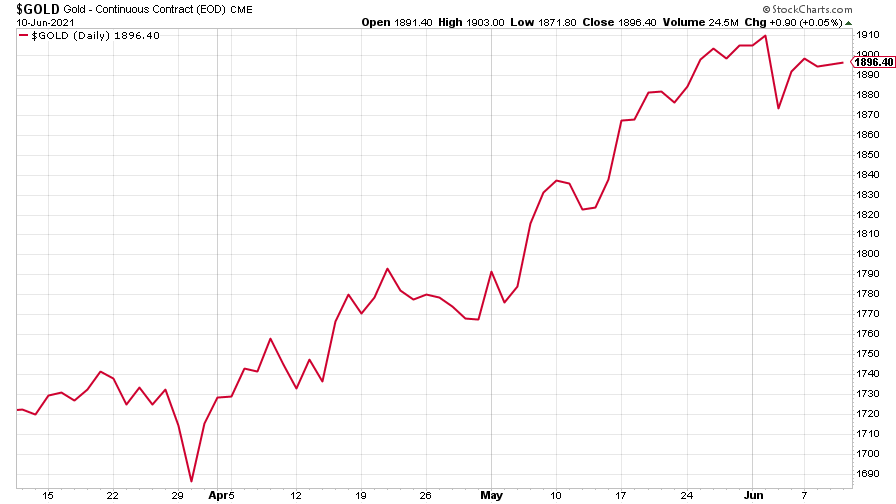
(Gold: three months)
The US dollar index (DXY – a measure of the strength of the dollar against a basket of the currencies of its major trading partners) is also treading water.
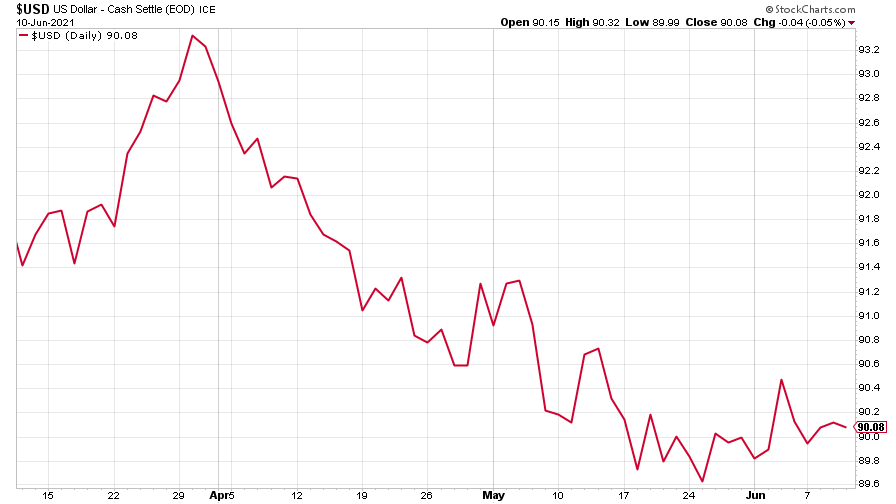
(DXY: three months)
While the Chinese yuan (or renminbi) just keeps getting stronger (when the red line is rising, the dollar is strengthening while the yuan is weakening).
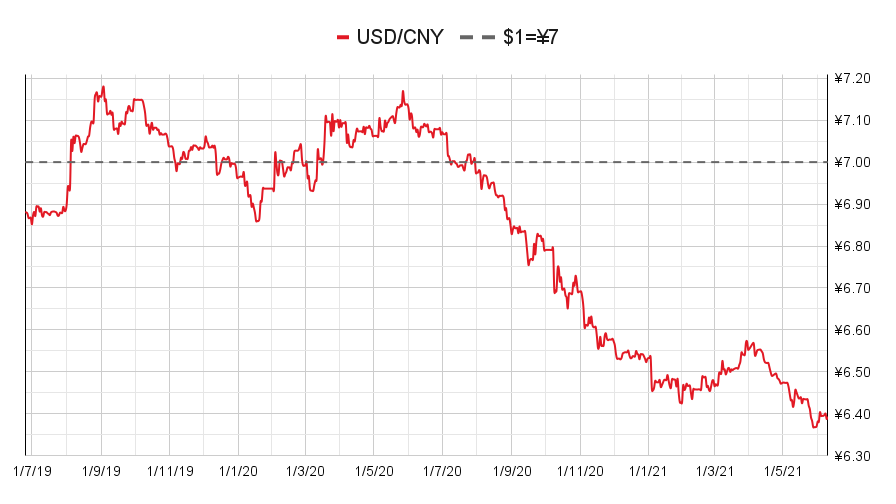
(Chinese yuan to the US dollar: since 25 Jun 2019)
The yield on the ten-year US government bond has dropped back to a level not seen since early March.
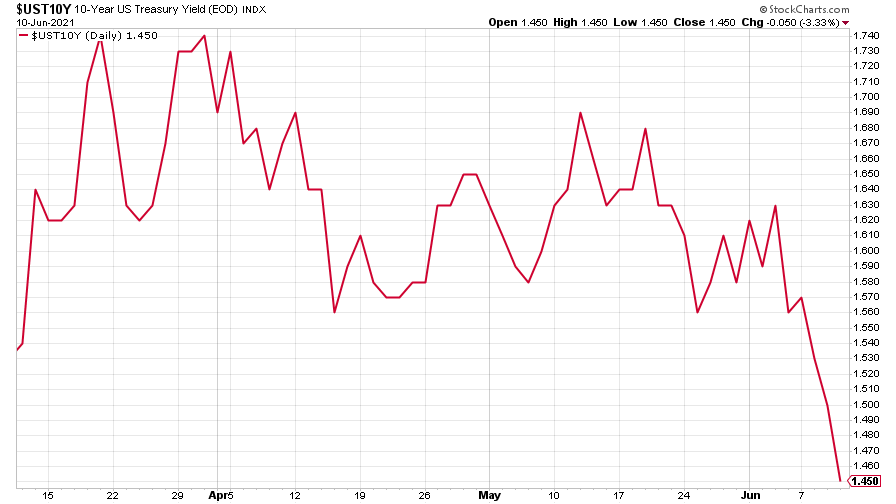
(Ten-year US Treasury yield: three months)
The yield on the Japanese ten-year bond has also taken a dive.
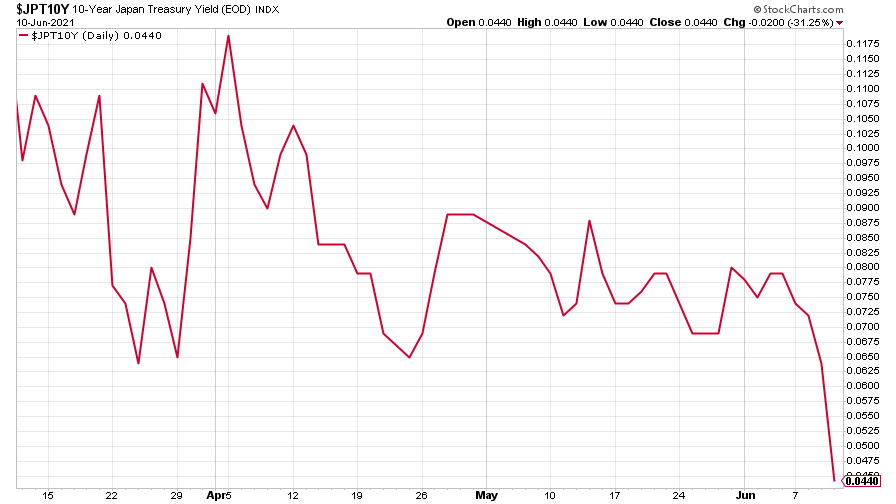
(Ten-year Japanese government bond yield: three months)
And the yield on the ten-year German Bund, followed suit.
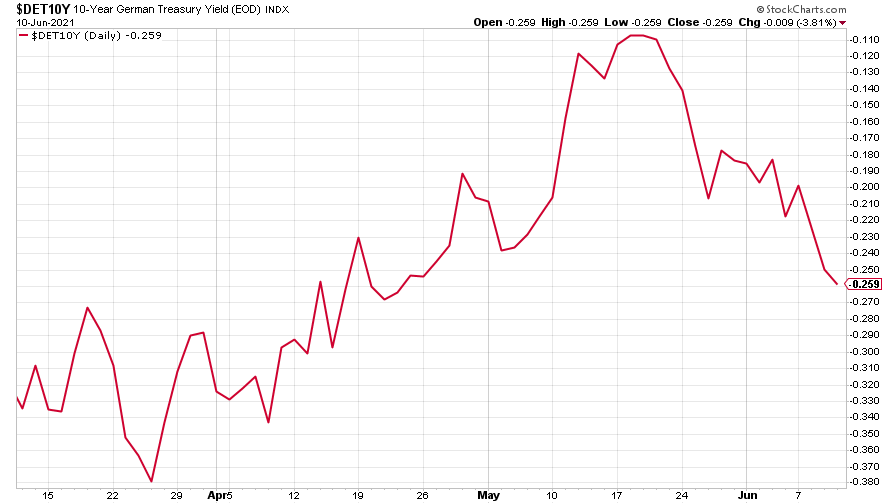
(Ten-year Bund yield: three months)
Copper is drifting from its recent high.
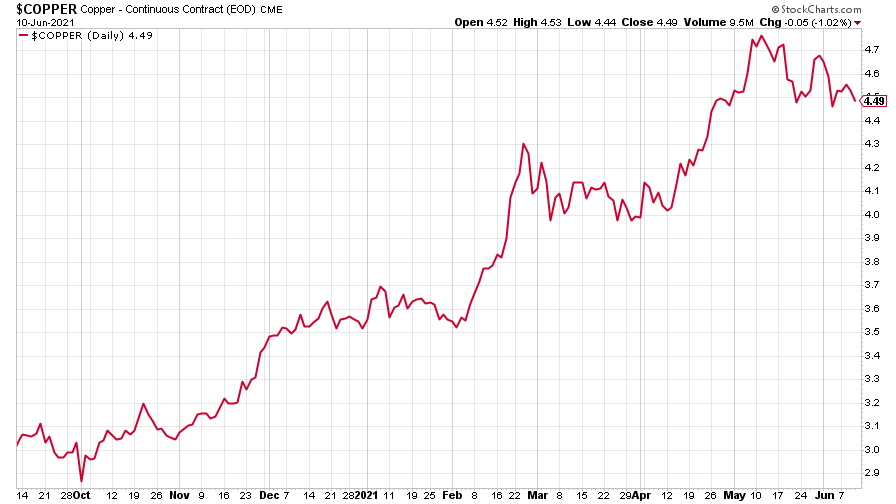
(Copper: nine months)
The closely-related Aussie dollar continued to meander sideways.
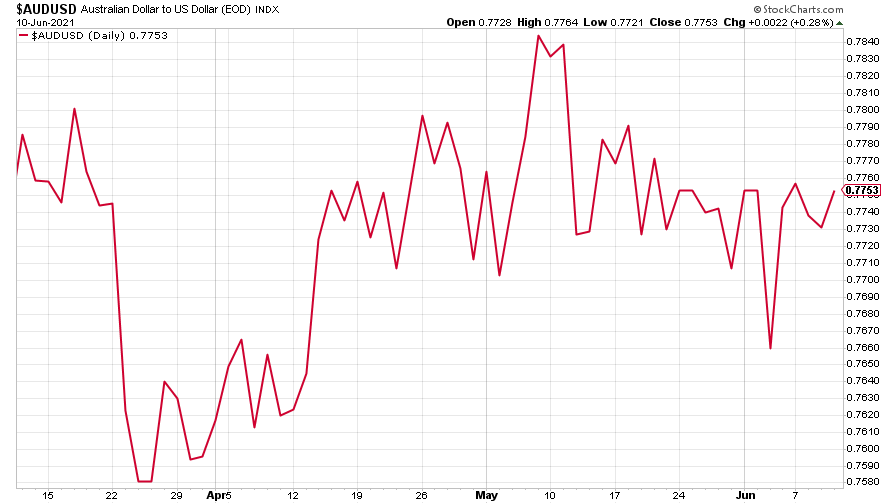
(Aussie dollar vs US dollar exchange rate: three months)
Bitcoin has so far failed to regain its recent losses.
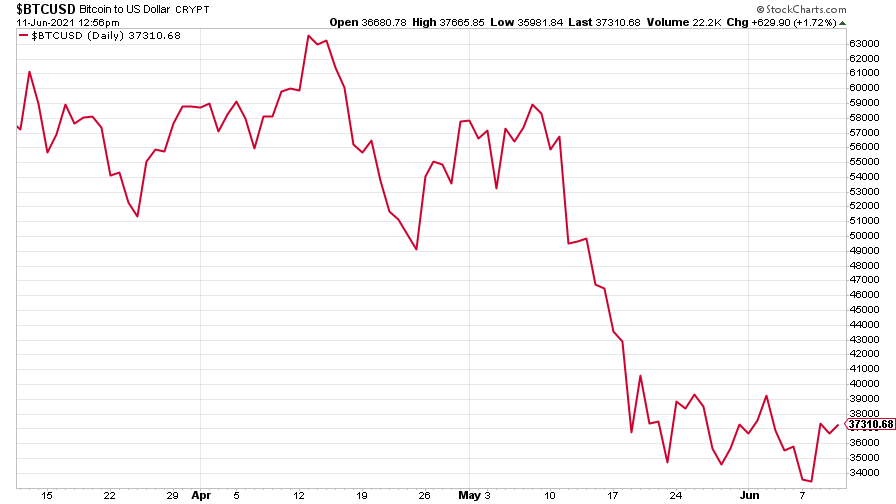
(Bitcoin: three months)
US weekly initial jobless claims took another fall, down 9,000 to 376,000, compared to 385,000 last week. The four-week moving average fell to 402,500, down 25,500 from 428,000 the week before.
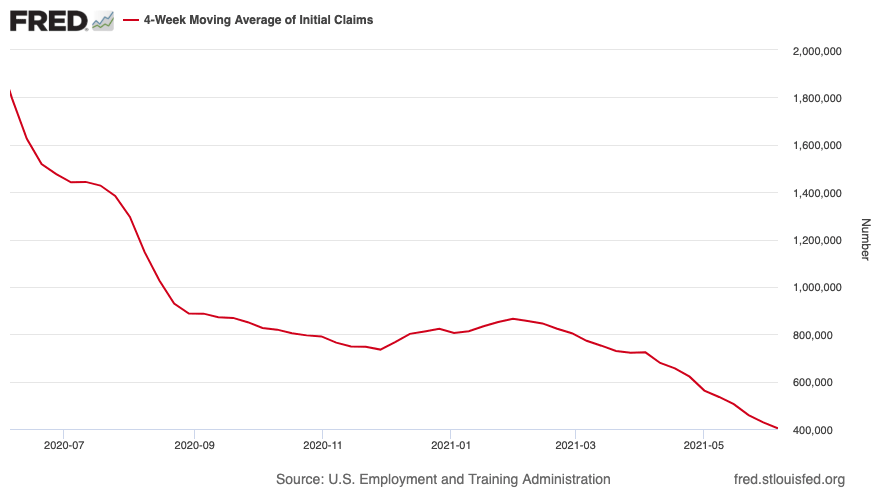
(US initial jobless claims, four-week moving average: since Jan 2020)
The oil price kept on climbing.
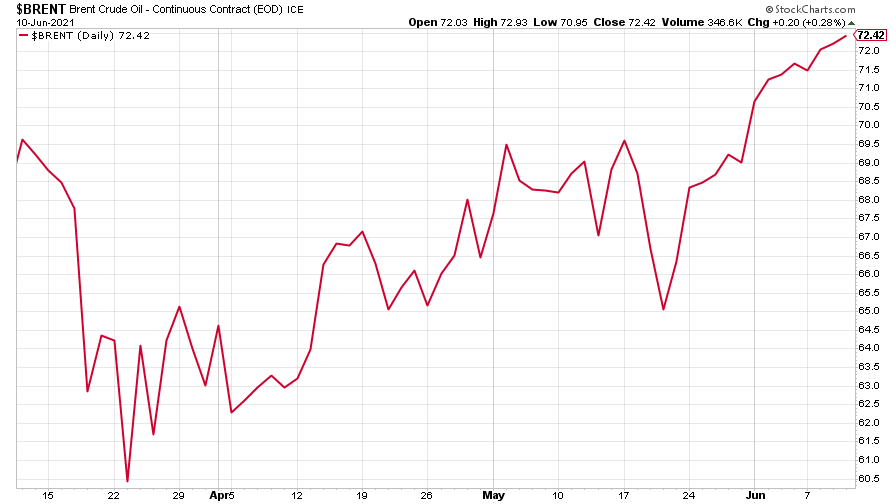
(Brent crude oil: three months)
Amazon rose sharply.
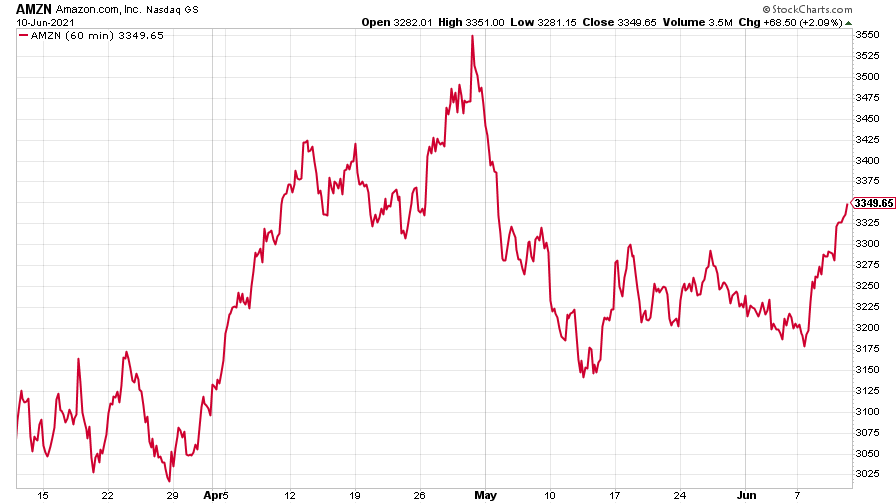
(Amazon: three months)
And Tesla made something of a recovery after the previous week’s losses.
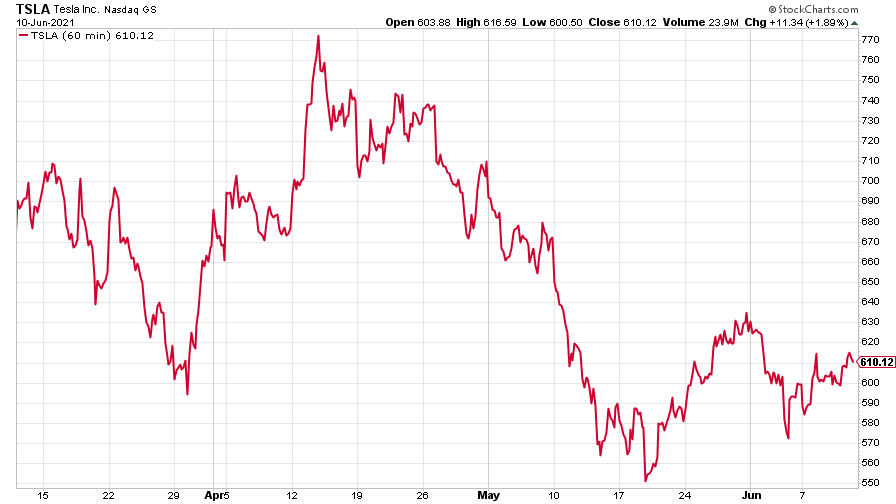
(Tesla: three months)
Get the latest financial news, insights and expert analysis from our award-winning MoneyWeek team, to help you understand what really matters when it comes to your finances.

-
 Can mining stocks deliver golden gains?
Can mining stocks deliver golden gains?With gold and silver prices having outperformed the stock markets last year, mining stocks can be an effective, if volatile, means of gaining exposure
-
 8 ways the ‘sandwich generation’ can protect wealth
8 ways the ‘sandwich generation’ can protect wealthPeople squeezed between caring for ageing parents and adult children or younger grandchildren – known as the ‘sandwich generation’ – are at risk of neglecting their own financial planning. Here’s how to protect yourself and your loved ones’ wealth.
-
 UK wages grow at a record pace
UK wages grow at a record paceThe latest UK wages data will add pressure on the BoE to push interest rates even higher.
-
 Trapped in a time of zombie government
Trapped in a time of zombie governmentIt’s not just companies that are eking out an existence, says Max King. The state is in the twilight zone too.
-
 America is in deep denial over debt
America is in deep denial over debtThe downgrade in America’s credit rating was much criticised by the US government, says Alex Rankine. But was it a long time coming?
-
 UK economy avoids stagnation with surprise growth
UK economy avoids stagnation with surprise growthGross domestic product increased by 0.2% in the second quarter and by 0.5% in June
-
 Bank of England raises interest rates to 5.25%
Bank of England raises interest rates to 5.25%The Bank has hiked rates from 5% to 5.25%, marking the 14th increase in a row. We explain what it means for savers and homeowners - and whether more rate rises are on the horizon
-
 UK inflation remains at 8.7% ‒ what it means for your money
UK inflation remains at 8.7% ‒ what it means for your moneyInflation was unmoved at 8.7% in the 12 months to May. What does this ‘sticky’ rate of inflation mean for your money?
-
 Would a food price cap actually work?
Would a food price cap actually work?Analysis The government is discussing plans to cap the prices of essentials. But could this intervention do more harm than good?
-
 Is my pay keeping up with inflation?
Is my pay keeping up with inflation?Analysis High inflation means take home pay is being eroded in real terms. An online calculator reveals the pay rise you need to match the rising cost of living - and how much worse off you are without it.
